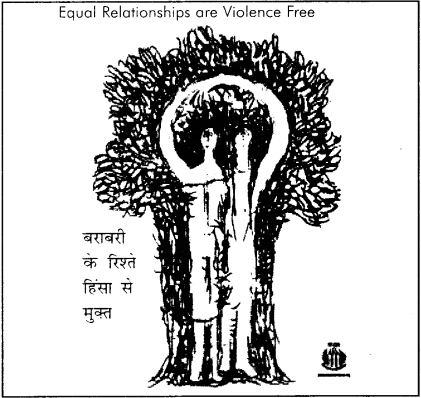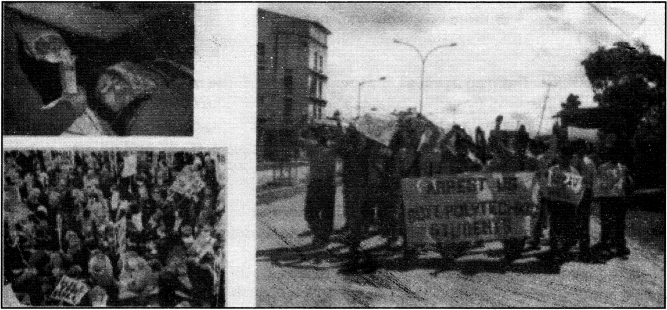Understanding Laws Class 8 Questions and Answers Civics Chapter 4
Civics Class 8 Chapter 4 NCERT Textbook Questions and Answers
Question 1.
State one reason why you think the sedition Act of 1870 was arbitrary? In what ways does the sedition Act of 1870 contradict the rule of law?
Answer:
The sedition Act of 1870 was arbitrary because according to this Act, the British could arrest and detain any person they wanted.
Question 2.
What do you understand by domestic ‘violence’? List the two rights that the new law helped achieve for women who are survivors of violence.
Answer:
‘Domestic Violence’ refers to the injury or harm or threat of injury harm caused by an adult, usually the husband, against his wife. The injury may be caused due to physical beating up the female or by emotionally abusing her, which includes verbal, sexual or economic abuse.
The two rights that the new law helped achieve for women who are survivors of violence includes :
- The right of women to live in a shared household. Women can get protection order against any further violence.
- Women can get monetary relief to meet their expenses including medical costs.
Question 3.
Can you list one process that was used to make more people aware of the need for this law?
Answer:
Public discussion.
Question 4.
From the story board given in text book pages 46, 47 and 48, can you list two different ways in which people lobbied Parliament?
Answer:
- Debating and
- submission of demand.
Question 5.
In the following poster, what do you understand by the phrase ‘Equal Relationships are Violence Free’?
Answer:
Equal relationship means both husband and wife have equal rights in the family. Neither of then can suppress each other. Such relations can be violence free because both husband and wife care for each other.
Often women who face violence or are abused are seen as victims. But women struggle in several different ways to survive these situations. Therefore, it is more accurate to refer to them as survivors rather than as victims.

Question 6.
List the three forms of protest that you see in the photos.

Answer:
- Hunger strike
- Dharna
- Rally.
Question 7.
Write in your own words what you understand by the term the ‘rule of law’. In your response include a fictitious or real example of a violation of the rule of law.
Answer:
‘Rule of law’ means all laws apply equally to all citizens of India irrespective of casting religion, sex, poor or rich. No one is above the law, not even the President of India. No one can be arrested for no crime he or she has done. Any violation of law has a specific punishment. A person is punished according to the type of crime he or she has committed.
Examples of violation of the ‘rule of law’.
- A two wheeler driver has to wear a helmet. But we often see public violating this law.
- Taking bribe is a crime. But we often read in newspapers governments officials taking bribe from the common people.
Question 8.
State two reasons why historians refute the claim that the British introduced the rule of law in India.
Answer:
Historians repute the claim that the British introduced the rule of law in India on several grounds. Some of them are as follows :
- Under the Sedition Act of 1870 any person protesting or criticising the British could be asserted without trial.
- The Indian nationalists played an important role in development of the legal sphere in India.
Question 9.
Re-read the story board on how a new law on domestic violence got passed. Describe in your own words the different ways in which women’s groups worked to make this happen.
Answer:
The government felt the need for a new law when complaints by the victims of domestic violence increased.
- Different forums raised the issue of domestic violence.
- Some groups of lawyers, law students and activists took the lead in drafting the Domestic Violence (prevention and protection) Bill. This draft was circulated in all areas.
- In 2002, the Bill was introduced in the Parliament.
- Some women groups opposed the Bill.
- A press conference was held regarding the above. In this conference a decision to start-on-line petition was taken.
- Many women organisations, National Commission for women made submissions to the Parliamentary Standing Committee.
- The Parliamentary Standing Committee, in Dec. 2002, submitted its recommendations to the Rajya Sabha. It was also tabled in the Lok Sabha.
- Most of the demands of the women’s group were accepted by the Committee.
- At last, a new bill was introduced in the Parliament.
- After being approved by both homes of the Parliament, it was sent to the President for he consent.
- In 2006, the Protection of Women from Domestic Violence Act. came into effect.
Question 10.
Write in your own words what you understand by the following sentence on page 44-45 : They also began fighting for greater equality and wanted to change the idea of law from a set of rules that they were forced to obey, to law as including ideas of justice.
Answer:
The arbitrary use of authority by the British pinched the Indian nationalists. They wanted to uproot it in order to bring equality. They wanted to eliminate the colonial laws which were in no way justified to establish the rule of law in the country.